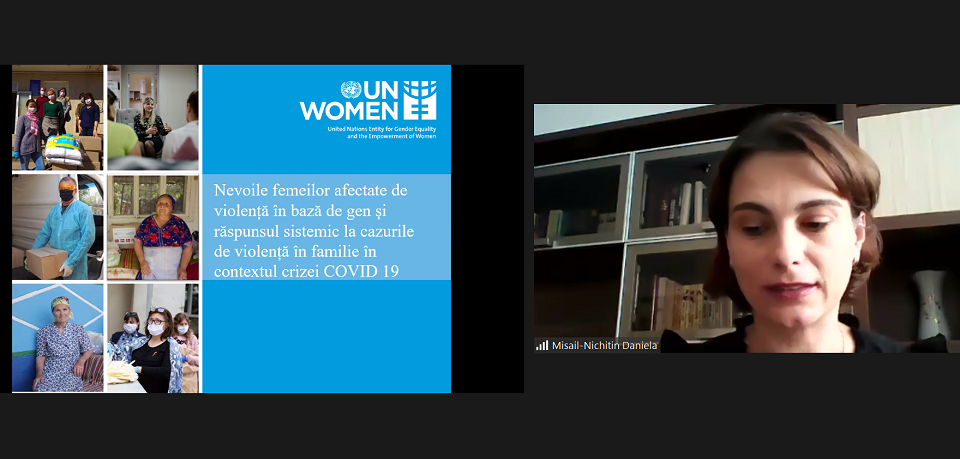Moldovan women affected by domestic violence are more vulnerable during the COVID-19 crisis
The restrictions required because of the COVID-19 pandemic contributed to the increase in the number of cases of violence against women, while many shelters had to close their doors for safety reasons. In this context, the lack of resources and communication channels to report the cases of violence and access essential support services, as well as the constant presence of the aggressors exacerbated the vulnerability of women and children victims of domestic and gender-based violence.Date:

In these circumstances, UN Women Moldova, in collaboration with ‘La Strada’ International Centre in Moldova, the Ministry of Health, Labour and Social Protection and with financial support from Sweden, performed a rapid assessment during May – June 2020 to understand how the crisis impacted women affected by domestic violence, to analyse the challenges of a systemic response to domestic violence cases and to identify potential systemic changes that would help cope with crises. The results of this rapid assessment were presented and discussed during an online press club held on 7 August.
This rapid assessment was conducted via 55 interviews with women affected by domestic violence as well as with professionals from the member organisations of ‘Life Without Domestic Violence’ Coalition, responders to cases of domestic violence, representatives of the justice system and of the Forensic Medical Examination Centre.
According to its results, women living in the urban area were more vulnerable to violence during the state of emergency (between 64% and 80% of calls to specialising organisations). Most of them are mothers to 1-3 children, are aged between 25 and 45 (fewer are older than 60) and have secondary education (80%).

Women experiencing domestic violence mainly are in need of essential products and money, a shelter and access to healthcare, psychological and legal support services. Also, because of the pandemic-related restrictions, women struggle with a significantly lower purchasing power, greater pressure because of kindergarten closures and online schooling, and with limited access to services and authorities and to protective measures against COVID-19.
“Frustration related to health risks, but also economic loses, uncertainty, lockdowns, restrictions in movement and deprivation, increase violence against women. At the same time, due to the measures in response to pandemics, services for prevention and protection of women from violence are less available, whether due to changed work regimes, lack of information on new modes of access to services, restricted movement or firmer control of perpetrators over women during lockdowns” – said Dominika Stojanoska, Country Representative at UN Women Moldova.
Oxana Paierele, Program Coordinator at the Embassy of Sweden in the Republic of Moldova: “We’ve seen good cooperation between the Embassy of Sweden and the relevant stakeholders over the last months, focused on achieving positive results for the ongoing provision and accessibility of services. These services cannot be discontinued by any means because the recent experience has shown that the pandemic is gender blind. It targeted all social groups, especially the vulnerable ones and, in some regards, it made the disparities wider.”

The system of support and protection of domestic violence victims had to cope with two challenges: continuing to address the needs of people experiencing violence while observing the infection prevention and containment measures. Therefore, many organisations had to reconsider their work arrangements and adjust the provided services, some of them having to go as far as suspending their operation to prevent outbreaks.
“The community of service providers was the most responsive, flexible and willing to mobilise for the sake of the beneficiaries at the very outset of the pandemic. Although it didn’t come up with the most sustainable solutions, it knew how to prioritise women’s greatest needs. The service providers rearranged their work regimes and tools and even identified additional funds for cases where women and children had to be taken out of the violent environment immediately’ – recounted Daniela Misail-Nichitin, Head of the Women Program at the ‘La Strada’ International Centre in Moldova.
The report also contains certain recommendations, identified as a result of the assessment, that are meant to improve the systemic response to the needs of domestic violence victims and their children. Key recommendations include supplying personal protection equipment to institutions, ensuring proper technical endowment of centres for victims of domestic violence, ensuring the availability and diversification of victim-centred services, diversifying accommodation services (social housing, crisis housing, etc.), expanding and diversifying programs for the economic empowerment of women affected by domestic violence and other recommendations.

The rapid assessment also resulted in some recommendations regarding amendments to the regulatory framework, which could support professionals is this area.
“This assessment will help us gain a more in-depth understanding of the phenomenon of violence and of the real needs of victims subject to a double impact: that of domestic violence and that of the pandemic”– mentioned Lilia Pascal, Head of the Gender Equality Policy Division of the Ministry of Health, Labour and Social Protection.